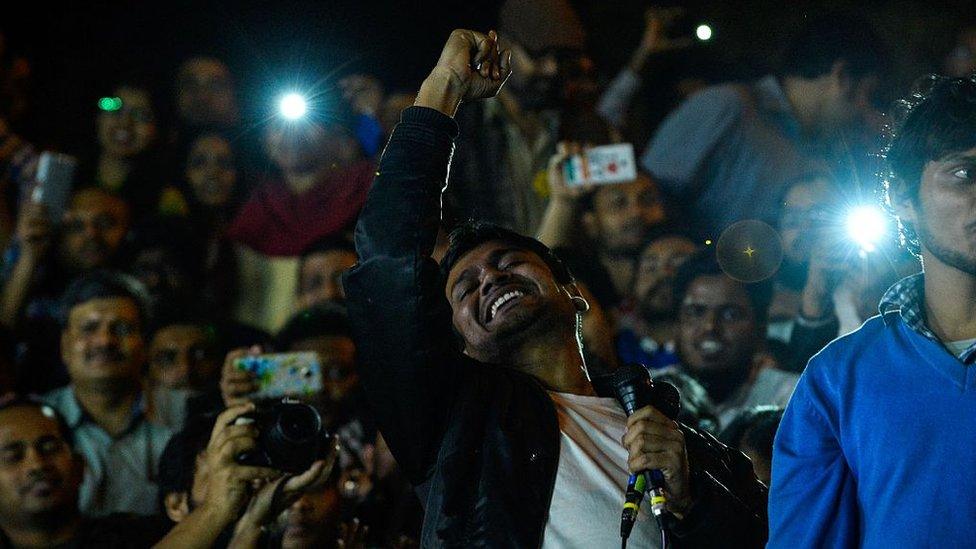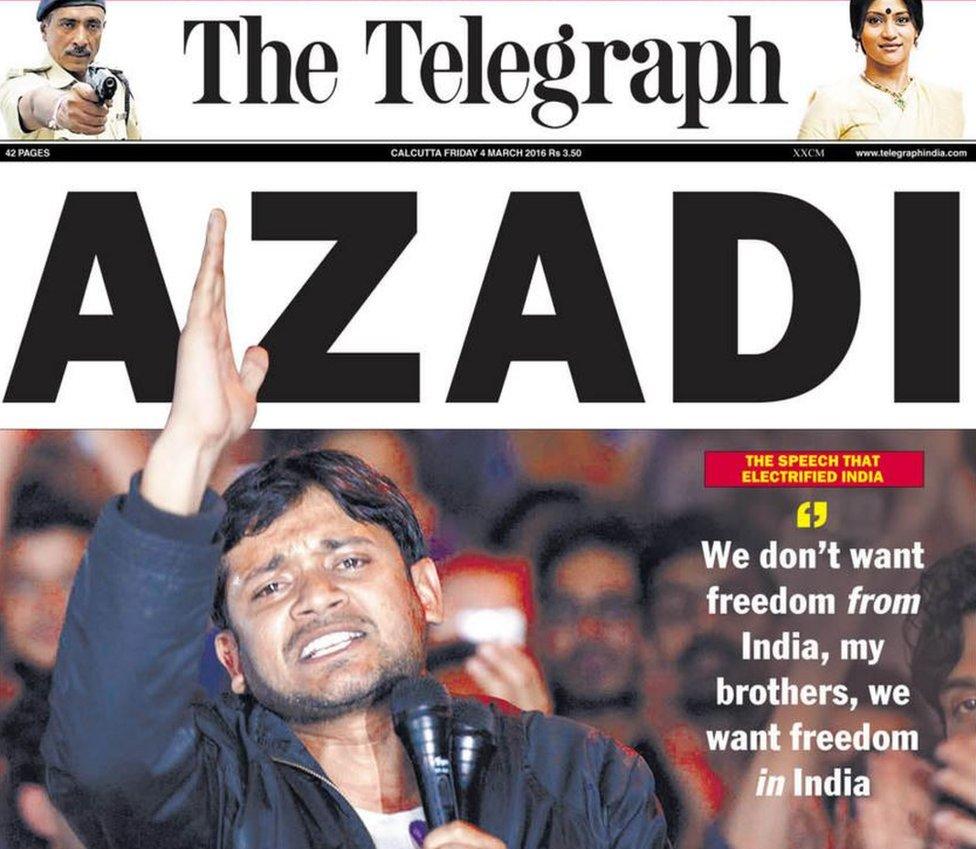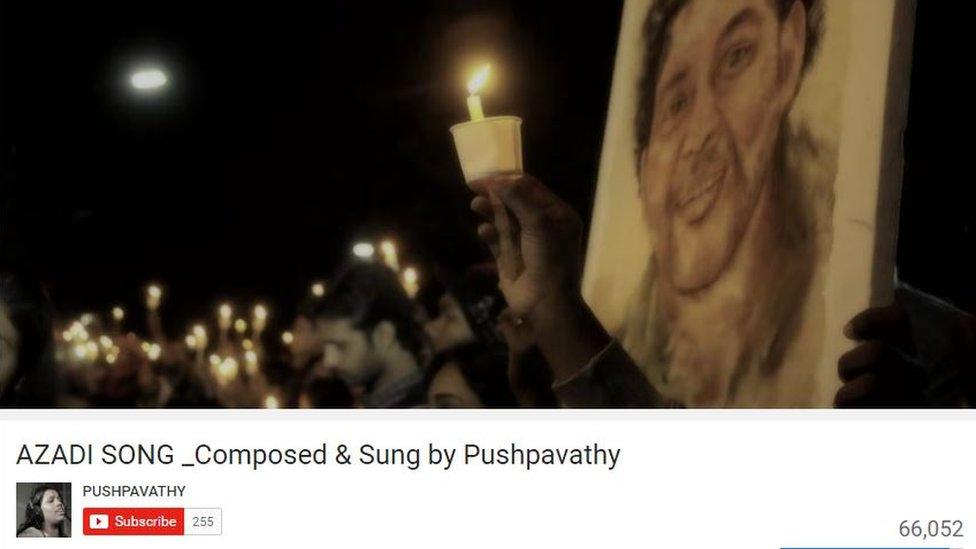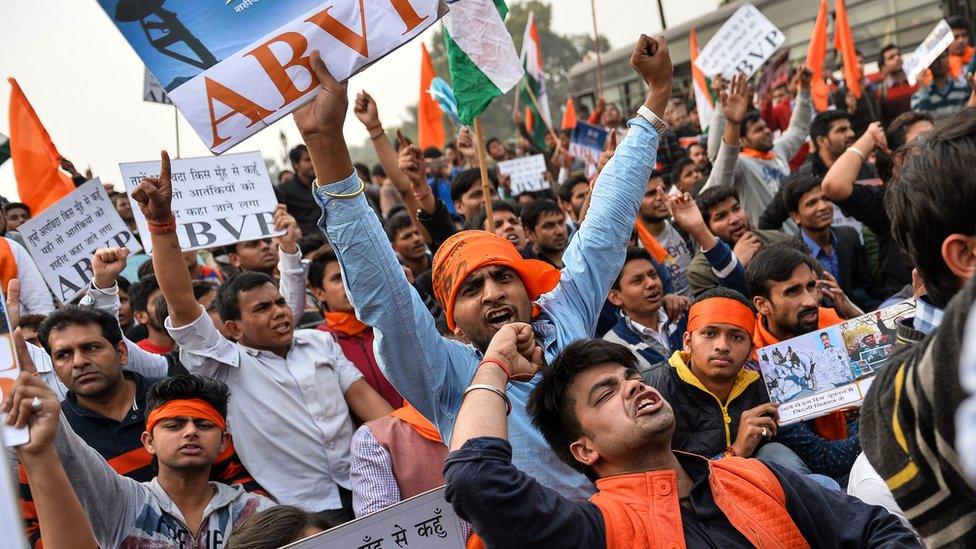Why an Indian 'freedom' speech has become a viral remix
- Published

Kanhaiya Kumar's arrest for sedition sparked a debate over free speech
When an Indian university student leader charged with sedition chanted slogans about "freedom", it struck a chord in the country - literally. The speech has been set to music, mixed with dubstep and inspired a crop of anthems, writes BBC Monitoring's Samiha Nettikkara.
The man is Kanhaiya Kumar, a 28-year-old PhD student at the prestigious Jawaharlal Nehru University (JNU) in Delhi, who is loved and loathed in equal measure. The self-confessed Marxist first grabbed headlines in February after he was arrested and charged with sedition for allegedly shouting anti-India slogans at a campus meeting. The slogan in question? "Azadi", or "freedom" in Hindi.
But why is the word freedom so contentious in India?
Originally a slogan raised by India's freedom fighters against the British pre-1947, the word has now become inextricably linked to the situation in Indian-administered Kashmir where the slogan is regularly used to demand independence from India.
The fact that the rally at which Mr Kumar was accused of raising an anti-India slogan was to protest against the hanging of Kashmiri militant Afzal Guru, convicted of the 2001 attack on India's parliament, only made the connection stronger.

Mr Kumar's speech about Azadi, or freedom, made front-page headlines in the country
But after Mr Kumar was freed on bail, he made a grand comeback on campus with a rousing speech in Hindi that was beamed on national television and streamed online by hundreds of thousands. "We are not seeking freedom from India but in India," roared Mr Kumar to a fervent audience.
He chanted, external for "freedom" from hunger, feudalism, capitalism and casteism. "We will get our freedom, whatever you do."
And then the chants took on a life of their own.
The Delhi government promised "freedom" from expensive bills in posters, external tweeted by a minister. Travel website Yatra.com made a spoof advertisement, external, asking their audience to use the web check-in facility to pick their preferred seat instead of "sloganeering".
Dubstep artist Siddharth Sharma, also known as Dub Sharma, remixed the speech with a Punjabi folk tune - and the catchy outcome, external became a viral earworm.
Last week, a group made a video, external for the song, capturing the polarised opinion about the student movement. The speech of another JNU student, Umar Khalid, who was accused of being a "terrorist", also got similar up-tempo musical, external treatment.

"Rust will eat your cage and the bird will fly away," say the Punjabi lyrics in Dub Sharma's remix
Tamil folk artist Kovan, who himself has been arrested, external for sedition, composed a song, external to show support for the JNU students. "Why do you hate the word freedom," asks the first line.
And earlier this month, Kerala singer Pushpavathy Poypadathu composed and released her rendition, external, ending it with a "red salute" - a greeting commonly used by Communists in India.
But what does the "freedom" mentioned by Mr Kumar in his speech mean to the artists who have started singing about it, 69 years after India's independence?
Mr Sharma told the BBC that for him it was about "the freedom that you are not able to properly exercise".
"Freedom of expression is on top of the priority list as of now. Unless you feel free to say what you think, you cannot be free."
The rhythm and a section of Mr Kumar's speech resonated with him. "The folk song I used in my track is an old Punjabi tune about freedom. It is old but the core issue is relevant even today."

A travel website spoofed Mr Kumar's slogans in its advertisement
For Ms Poypadathu, the chants remind her of the caste discrimination she herself has experienced. Despite her songs being very popular, she says she is seldom invited for performances.
"Freedom to me means that those with ability get what they rightfully deserve, irrespective of skin tone or caste."
It's not surprising then that her song shows visuals of Rohith Vemula, the Dalit student who emerged as a symbol of protest against injustice after his suicide.

Rohith Vemula, a PhD student at the Hyderabad Central University, had killed himself
But what did "freedom" originally mean in India?
"Azadi has its roots in the nationalistic movement along with other slogans like Inquilab Zindabad (Long Live the Revolution), Bharat Mata ki Jai (Hail Mother India) and Vande Mataram (I praise thee, Mother). These slogans spanned the political spectrum, from left to right," explains Arvind Rajagopal, a professor of media studies at New York University.
"The vocabulary of slogans does not guarantee what kind of politics the movement stands for."
Mr Kumar's chants in particular also have an unexpected link, external to the South Asian feminist movement in the 90s and noted figure Kamla Bhasin's call for freedom from patriarchy, hierarchy, violence and silence.
"Now again, its [freedom] meanings have broadened. The use of freedom now is about freedom within India and not from India," adds Mr Rajagopal.

Right-wing student groups have supported the arrest of JNU students
This is not a view unanimously shared in the country.
Counter protests have accused JNU of being a "hotbed of traitors" and say it should be "cleaned up". Angry government ministers also have not backed down in their stance against the JNU students and have vowed to punish the "anti-national elements".
Columnist Shefali Vaidya says she feels perfectly free in India and finds the entire debate "ridiculous".
"Our freedom has not been compromised in any way." she says. "Kanhaiya Kumar has been expressing his opinion 24x7. Where are the restrictions?"
Ms Vaidya is also the author of Hotel JNU, a viral parody, external of The Eagles' Hotel California that mocked the student protest and even inspired a song cover contest, external.
"The word Azadi is easy to use. People on the streets don't care for empty rhetoric. They want the freedom to have a real life and to raise a family in peace," she says.
And what about Mr Kumar himself? In an interview, external with Al Jazeera, he says the word "freedom" has a big ambit.
"Azadi is also about getting rid of issues facing the country. By relating meaning of Azadi with unity and sovereignty of the country, there was an attempt to misinterpret it."
- Published10 April 2016
- Published11 April 2016

- Published11 April 2016

- Published10 April 2016

- Published11 April 2016
